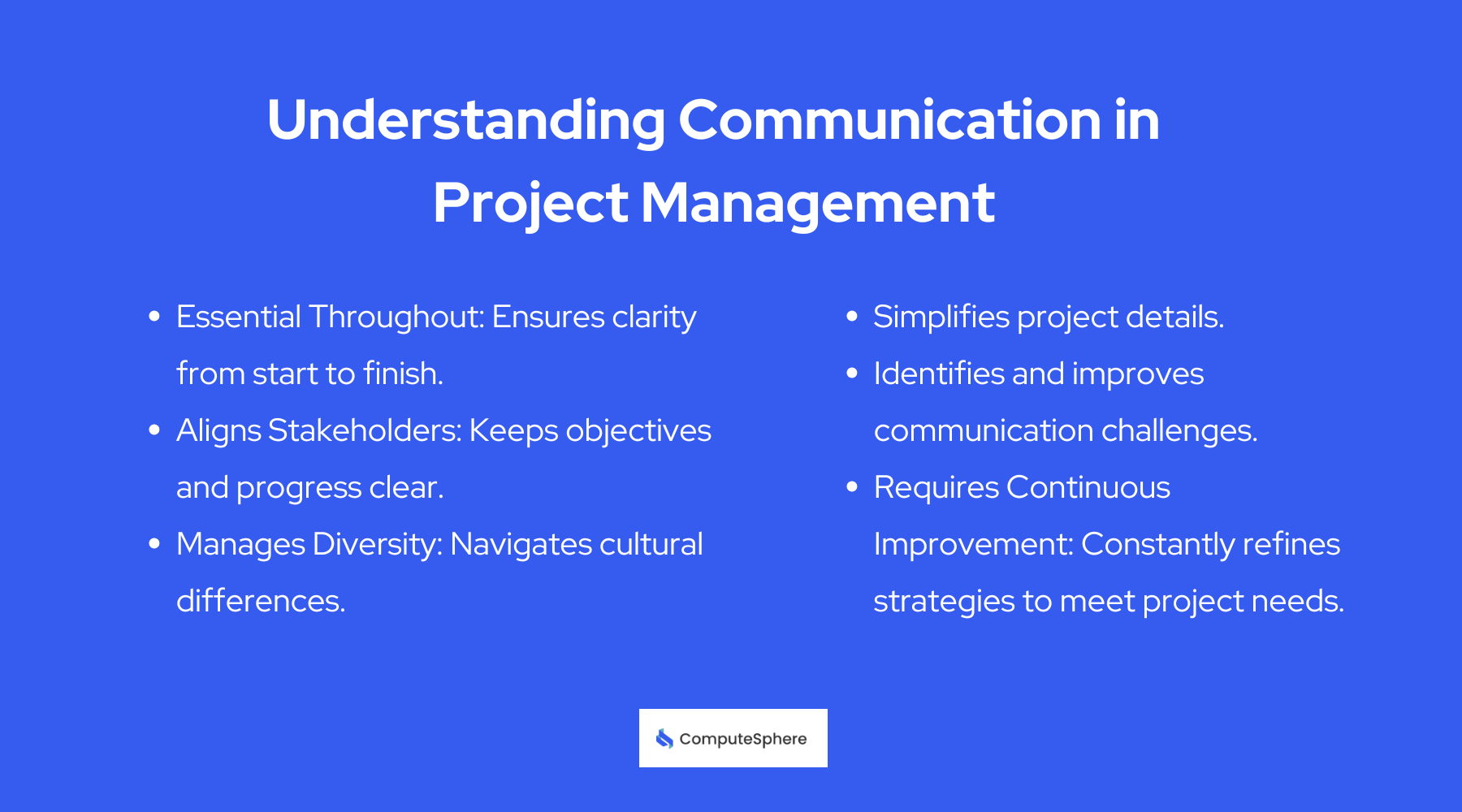Key Communication Strategies for Successful Project Managers

Effective communication is the backbone of successful project management. It ensures that all team members are aligned, objectives are clear, and progress is consistently monitored. Poor communication, on the other hand, can lead to misunderstandings, missed deadlines, and project failure. Without clear and effective communication, even well-planned projects can fail - making the difference between success and failure for project managers.
Explore practical communication strategies for project managers like yourself below. These include the best techniques to improve your leadership skills and guide your projects to successful completion.
Understanding the Role of Communication in Project Management

Communication is important in every phase of a project, from initiation to completion. It ensures that everyone in your team is involved in understanding the project's goals, their roles, and the expectations placed upon them. Project managers often face communication challenges such as differing stakeholder expectations, cultural differences within the team, and the complexity of project information. So, recognizing these challenges is the first step toward overcoming them.
Developing a Communication Plan
A well-defined communication plan is equally important for ensuring that information flows seamlessly throughout the project lifecycle. First, set clear objectives for what you aim to achieve with your communication. This could include keeping stakeholders informed, aligning team members, or managing risks.
Next, identify all the individuals or groups involved in the project and understand their communication needs and preferences. You must choose the appropriate channels for different types of information, ranging from emails for formal updates to instant messaging for quick clarifications. Determine how often you will communicate with each stakeholder group, as regular updates can prevent misunderstandings and keep everyone informed.
Choosing the Right Communication Channels
Selecting the right communication channels is next to developing a communication plan for effective information exchange. Email is ideal for formal communication, detailed updates, and documentation. Instant messaging apps like Slack and Microsoft Teams are great for quick questions, informal discussions, and real-time collaboration.
Video conferencing tools such as Zoom and Google Meet are best for virtual meetings, presentations, and brainstorming sessions. Project management software like Asana and Trello is useful for tracking progress, assigning tasks, and maintaining project documentation. You must consider choosing the appropriate channel based on the context and urgency of the message, as this can broadly improve your clarity and responsiveness.
Improving Your Active Listening Skills
Active listening is an important skill that many project managers often overlook. It involves fully concentrating, understanding, responding, and remembering what is being said. Providing full attention to the speaker, avoiding interruptions, reflecting and paraphrasing, and asking open-ended questions are important techniques for improving active listening. You can build stronger relationships, resolve conflicts more effectively, and forge a more collaborative environment as a project manager by actively listening to others.
Create Clear and Concise Messages
The next crucial aspect to focus on is clear and concise communication. This is important for preventing misunderstandings and ensuring that your messages are easily understood. To create effective messages, be clear and to the point, use simple and direct language, avoid jargon and technical terms, and structure messages logically.
For example, when sending an email, start with the main point, provide necessary details, and conclude with any required actions or follow-ups. This approach helps ensure that your message is understood and actionable.
Use Visual Communication
Visual aids can significantly improve the understanding of complex information. Charts and graphs are useful for presenting data and trends, flowcharts are best for illustrating processes and workflows, infographics are great for summarizing information and making it more engaging, and mind maps are helpful for brainstorming and organizing ideas. Incorporating visual elements into presentations and reports can make your information more accessible and engaging for stakeholders.
Promoting an Open Communication Culture
As a project manager, you must create an environment where open communication is encouraged, as this can lead to more innovative ideas and improved problem-solving within your team. Regular check-ins and feedback sessions, creating a safe environment for sharing ideas, and recognizing and addressing communication barriers are a few important strategies for promoting a culture of open communication.
By bringing an open communication culture, you can greatly increase your team collaboration and improve overall project performance.
Managing Conflict Through Effective Communication
Conflicts are inevitable in any project, but effective communication can help manage and resolve them constructively. Active listening and empathy, finding common ground, focusing on solutions rather than problems, and maintaining professionalism and respect are key techniques for conflict resolution. Maintaining a positive team dynamic and efficiently resolving conflicts are important aspects of your role as a project manager, ultimately influencing healthy team management overall.
Continuous Improvement of Communication Skills
Effective communication is an ongoing process that requires continuous improvement. Attending workshops and training sessions, reading books, taking online courses, and seeking feedback from mentors and peers are excellent ways to improve your communication skills. By continually honing their communication skills, project managers can stay ahead of the curve and lead their teams more effectively.
Conclusion
Effective communication is fundamental to successful project management. By developing a comprehensive communication plan, choosing the right channels, improving active listening skills, creating clear messages, using visual aids, promoting an open communication culture, managing conflicts constructively, and continuously improving skills, you can ensure your projects run smoothly and your team remains motivated and aligned. Implementing these strategies will not only improve your project outcomes but also contribute to a more collaborative and positive work environment.
Contents
Built for Builders. Priced for Startups.
Tired of unpredictable cloud bills? ComputeSphere offers modular, fixed-cost cloud hosting that grows with your startup—no DevOps headaches, no surprises.
Get StartedShare this article
Browse Some Related Blogs
Relevant and related contents you can read









